Future Indirect Fires Content Library

Future Indirect Fires | 2026 Official Agenda
IDGA are delighted to announce that our Future Indirect Fires Summit is returning on January 27-28, 2026, at the Westin Hotel in Arlington, Virginia.In it's new location, the 2026 summit will continue to grow, evolve, and expand as we bring together 300+ leaders from the indi ...
New Content!

2026 Attendee Snapshot
Curious to see who will be attending the Future Indirect Fires Summit?
IDGA are proud to release our 2026 attendee snapshot, highlighting the senior leaders and organizations from the military and industry, who will be joining us onsite.

2026 Pre-Show Report
For the past three years, IDGA has been proud to support the indirect fires community through its Future Indirect Fires Summit. The two-day conference annually hosts leaders from the U.S. DoD and its industry partners to discuss the latest innovations and modernizations in indirect fire systems, support systems, munitions, and the role of indirect fires in Europe and the Indo-Pacific.
One of the key benefits of this year’s summit is the opportunity to hear from program leaders of key DoD artillery initiatives such as the US Army’s Self-Propelled Howitzer (SPH-M), Project LASSO, and the US Marine Corps OPF-L Program, giving attendees the insights needed to anticipate change and adapt effectively.
Before the 2026 summit begins January 27 in Arlington, Virginia, IDGA presents the following “Future Indirect Fires 2026 Pre-Show Report”. The next eight pages highlight speakers at the upcoming conference, key themes to discuss, and much more.
Artillery Market Report 2025-2029: United States
IDGA’s Future Indirect Fires Summit is committed to supporting the DoD as it develops next generation capabilities and fires recapitalization. The two-day event, taking place January 27-28, 2026 in Arlington, Virginia, will provide two days of thought leadership discussion on modern warfare and the quest for increased firepower. Leaders from across the indirect fire community will gather to discuss the latest innovations and modernizations in indirect fire systems, support systems, munitions, and the role of indirect fires in Europe and the Indo-Pacific.
Before the conference, IDGA is proud to bring the fires community the “Artillery Market Report 2025-2029: United States”. The following is a U.S.-specific version of Defence IQ’s International Artillery Market Report 2025-2029. In this report we will look at the general trends in the international artillery market, before narrowing the focus on the United States, which includes an overview of over twenty different artillery initiatives ongoing within the U.S. DoD.
From the Battlefield to the Pentagon: Colonel Gregory Tomlin on Leading Army Transformation
During his 24-year tenure in the Army, Colonel Gregory Tomlin has seen his fair share of transformation efforts. A career Field Artillery officer, he has served in four divisions—the 1st Armor, 1st Infantry, 2nd Infantry, and 7th Infantry—and commanded both M109A6 and M777 units. His operational experience spans deployments to Iraq, where he served as a rifle platoon leader and later as a military advisor, and Kosovo, where he was task force Information Operations officer.
Beyond command, Colonel Tomlin has held key staff assignments on the Army and Joint Staff, including Chief of Targeting Doctrine and Policy on the Joint Staff J-2 and Chief of Army Readiness in the Army Staff G-3/5/7. He has also served as a White House Military Social Aide during the Obama administration and as an assistant professor of history at West Point. In July 2024, he assumed his current role as Army Capability Manager for Division Artillery Formations.
Now, with a new administration in the White House and new leadership in the DoD, Colonel Tomlin is embracing the latest Army Transformation Initiative, which includes plans to modernize the force, increase lethality, and restructure formations. In the latest interview from IDGA, Colonel Tomlin sat down to share his role in the Army’s Transformation Initiative as well as the value of international collaboration, and much more. The views he expresses are his own and do not necessarily represent those of the U.S. Army or the Department of Defense.

Cannon Artillery and Mortar Modernization Presentation
Delivered by Colonel Leon L. Rogers II, Project Manager, Combat Ammunition Systems (PM CAS), JPEO Armaments & Ammunition, US Army, at our 2025 Future Indirect Fires Summit, this presentation delves into:
- PM-CAS Vision
- PM CAS Modernization Priorities
- Exploring Options to Improve Survivability and Mobility
- Mortars Modernization
- The Enduring Value of Tube Launched Artillery

U.S. Army Combat Capabilities Development Command Armaments Center Presentation
Delivered by Dave Musgrave, Chief Engineer for DEVCOM-AC’s Artillery Fire Control Systems Division, US Army, at our 2025 Future Indirect Fires Summit, this presentation delves into the U.S. Army Combat Capabilities Development Command Armaments Center.
Download to find out:
- DEVCOM AC Overview
- Armaments Center Core Competencies
- Assured Armaments Reference Architecture (AARA) for Fire Control
- Software Reuse vs Design for Modularity Upfront
- AARA, Rapid Indirect Fires Procurement and US Network Interoperability
- Why Should You Care?
Event Information
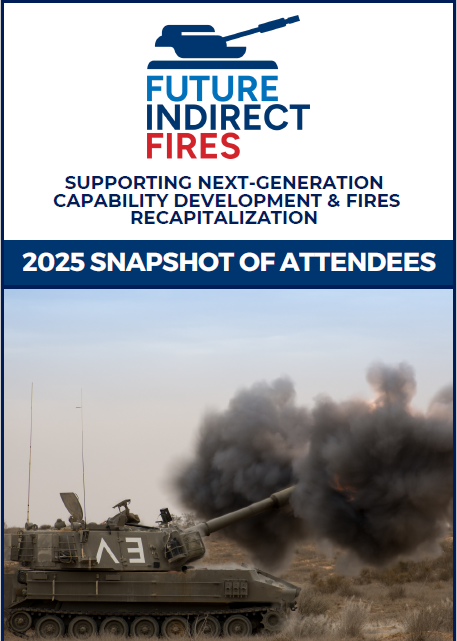
2025 Attendee Snapshot | Future Indirect Fires
Interested in seeing who attended the IDGA 2025 Future Indirect Fires Summit? Take a look at the attendee snapshot, featuring the companies, military leaders, and government officials who joined us in 2025, many of whom are expected to return in 2026!
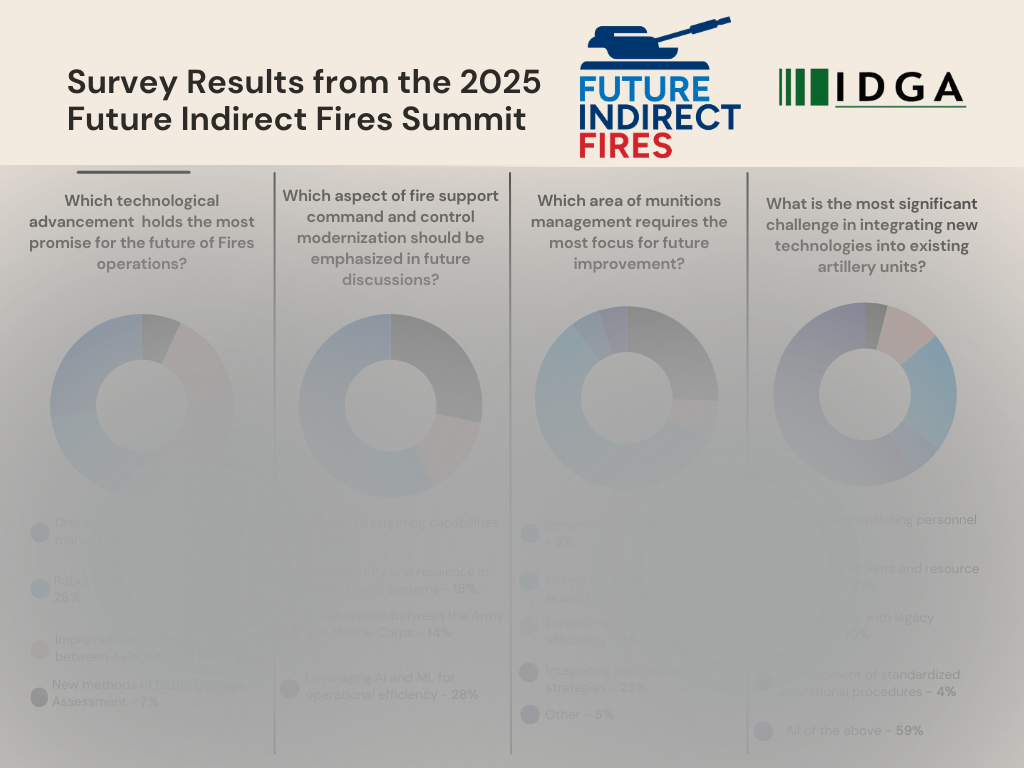
On-Site Survey Results from the 2025 Future Indirect Fires Summit
In January 2025, IDGA hosted its Future Indirect Fires Summit in Austin, Texas. This two-day event brought together leaders from the indirect fire community to discuss the latest innovations in indirect fire systems, support systems, munitions, and challenges presented by the current conflict in Ukraine. Discussions on-site also focused on achieving enhanced lethality, survivability, precision, and range.
Throughout the event, attendees were urged to participate in live polling to share their thoughts on the current status of indirect fires in the U.S. Military. The following infographic displays survey results on topics such as:
- Which technology advancements hold the most promise for future fires
- Areas of munitions management that require the most attention
- The challenges of integrating new technologies into existing artillery units
Sponsorship & Exhibition Information

2026 Future Indirect Fires - Sponsorship & Networking Prospectus
View the Future Indirect Fires 2026 - Sponsorship & Networking Prospectus, and explore:
- 2026 Expert Speakers
- Producer & Chair Welcome
- Who You Can Meet Onsite
- Sponsorship Opportunities
- Attendee Testimonials

2026 Future Indirect Fires - 2026 Attendee Snapshot
View the Future Indirect Fires 2026 Snapshot of Attendees, and explore:
- 2026 Attendee Organizations confirmed to join us
- 2026 Attendee Job Titles confirmed to join us
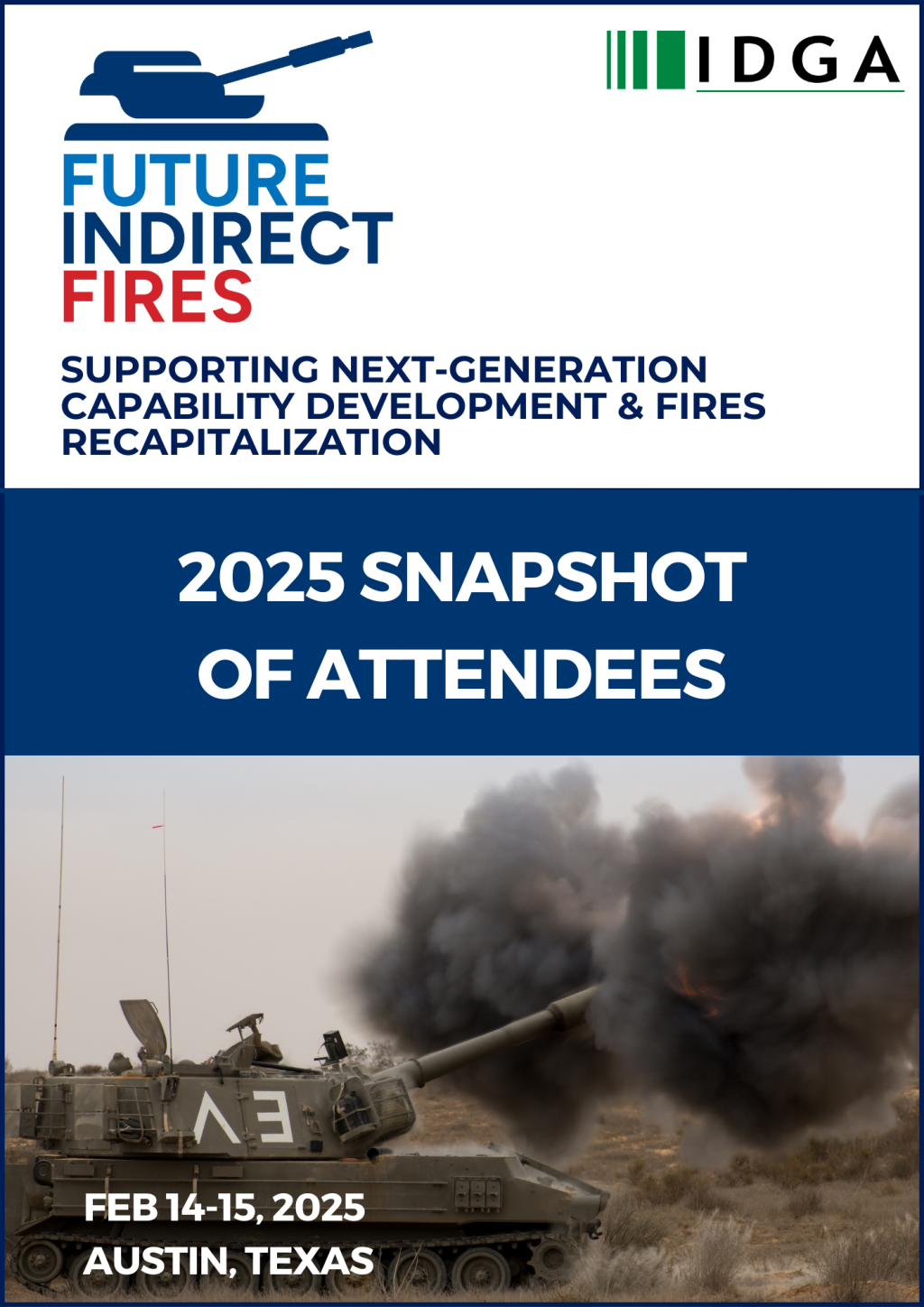
2026 Future Indirect Fires - 2025 Attendee Snapshot
View the Future Indirect Fires 2025 Snapshot of Attendees, and explore:
- 2025 Attendee Organizations
- 2025 Attendee Job Titles


